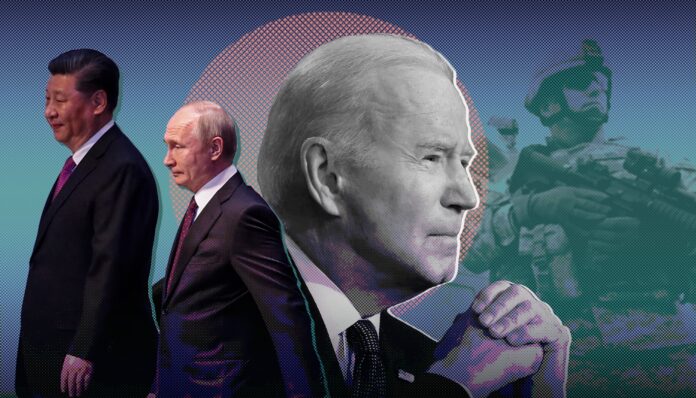Author: David Hearst
Affiliation: Middle East Eye
Organization/Publisher: Middle East Eye
Date/Place: December 27, 2021/UK
Type of Literature: Opinion
Word Count: 2549
Link: https://www.middleeasteye.net/opinion/us-suez-moment-strategic-mistake-would-be-its-last
Keywords: The United States, China, Russia, Afghanistan, Iran, Ukraine, Middle East, Palestine, Israel
Brief:
The author suggests that Joe Biden, as his four predecessors, has also made political mistakes. Even though he was the vice president for Barack Obama’s administration, he has failed to recognize those faults both then and now. It is not only the latest failure with the withdrawal from Afghanistan, but it is Iran, the Ukraine, and Taiwan too. Although after the Cold War the US had 720 military bases in 80 countries and the world’s largest reserve currency, the assumption of the US monopoly on the world seemed to fail when Russia intervened in the war in Syria. And the assumption that the US could implement a rules-based world order has failed, ending when Biden admitted the great powers will be forced to manage their competition. The author explains that after the end of the Cold War, since the threat of the Soviet Union was no longer on the scene, the US embassies started to become the spokespersons for Russia. When NATO pushed the line further east for any future confrontations, the ‘Russian Army’ sounded like a joke; however, it currently is no longer a joke with Russia’s response of 90,000 troops on the Ukraine’s borders. In this political struggle, the only victim seems to be the Ukraine with the fear of civil war, even though it was once the only country that was united socially and politically. On the other hand, in ‘managing’ the competition with China, reassuring or confronting President Xi doesn’t seem to be working well either. The US somehow doesn’t count itself responsible for the famine in Afghanistan after its withdrawal, but blames the current Taliban regime and its alleged suppression of women’s education and killing foreigners in the country. The author blames the US as the direct reason for the countrywide famine since the US Treasury has frozen the Afghan central bank’s $10 billion overseas assets in addition to Afghanistan’s $1.3 billion gold reserves in New York—leaving it with no money to function by itself; under US occupation, Afghanistan’s national budget was 90% dependent on foreign aid. This brings the question of how serious the United States is in stabilizing Afghanistan, which means supporting the alliance of China, Russia, and Pakistan. The author concludes that since the countries could now advance their armies and weapons on their own and are willing to do so, using military force or sanctions policies are no longer functional for regime-changing. To have balance in the region and to avoid furthering China and Russia’s growing influence, the safest route—without committing any devastating events in the meantime—is to remove the sanctions on Iran since it has no intention to compromise on its security when it is Israel that illegally possesses multiple nuclear weapons. The author finally asks that if “Washington claims itself as a champion of human rights start with Egypt and Saudi Arabia and make Israel pay a price for illegal settlement in Palestine. After the damage done this century by conflicts ordered, created, and backed by US presidents – Afghanistan, Iraq, Syria, Yemen, Libya – that is not only a responsibility but a duty. Another US strategic mistake would be its, and Western Europe’s, last.”
Critical Analysis:
The author’s opinion is not comprehensive and applies limited available resources when analyzing the US’ global policy. Even though the numerical figures of military forces and historical outline are given, the soft power and cyber wars between China, Russia, and the US are not mentioned in the context of their rivalry; for example, the popularity of various social media platforms and their impact or intervention on politics, (e.g., government restrictions against Chinese-made apps TikTok and WeChat in the US, and commercial controls against telecom provider Huawei). The author’s observations reference only historical background and current political events and military advances, such that the other components can be easily missed or overlooked.
By: Cemile Cengiz, CIGA Research Assistant




